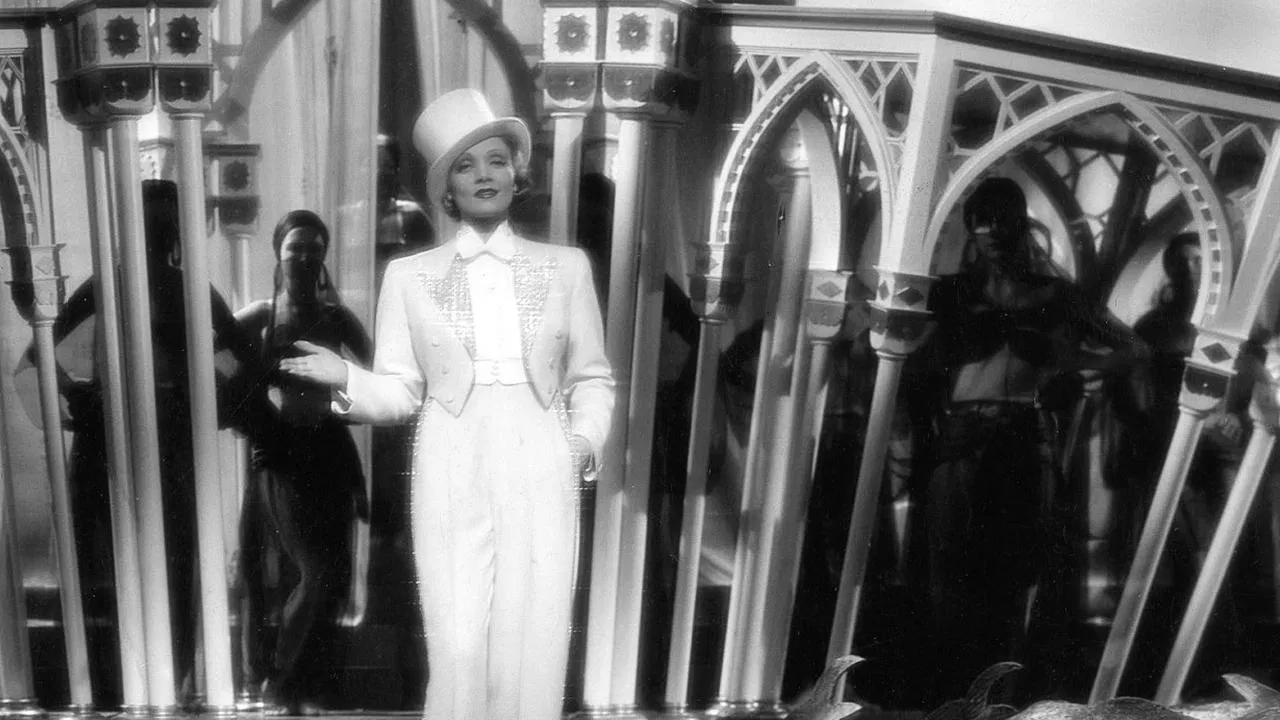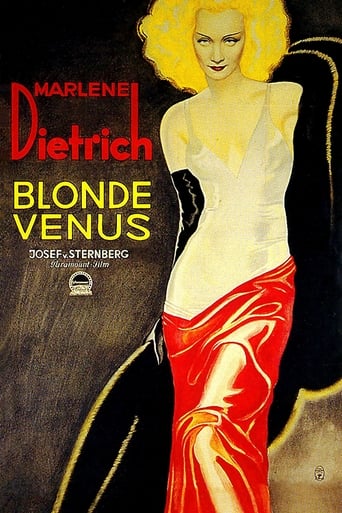

Von Sternberg must have been railing lines of coke when he came up with this soapy drivel. Look, you've got Marlene under your thrall. Put her in some movies where she can sing a bit, show her legs a bit. Can't be that hard. What you don't have to do is create a movie with more plot points than an entire season of Breaking Bad. I mean, one minute she's crawling through a Mississippi flop house, the next scene she's in a white tux singing French to the French. On the other hand it is beautifully photographed. Marlene, well, even when she's on the lam, staying in a rooming house with chickens, she's the hottest thing in movies. I mean, holy smokes, look at the way she brushes the pigeon off her shoulder. I had trouble deciding which male lead I wanted to punch in the face harder: the sap Faraday (Marshall) or the obnoxious Townsend (Grant). I can't see how Dietrich's character could have spent more than 10 minutes with either of them. Dietrich deserved better writers.
... View MoreJosef Von Sternberg really went over the top with this outrageous pre-code melodrama starring Marlene Dietrich about a devoted wife and mother (first seen as a single German girl swimming naked in a lake in her homeland) who becomes a kept woman in order to financially help her husband be cured of uranium poison. She later runs off with her son when he comes back and discovers her affair with Cary Grant, becoming a prostitute and later basically homeless in order to keep their whereabouts secret. She is forced to give him up, and is basically destitute when her fortunes turn and she becomes the singing toast of Paris. Von Sternberg lets Dietrich utilize every single emotion possible, running all over the world in every style, yet barely shedding a tear over all of heartache.Herbert Marshall is the unfortunate husband and Dickie Moore the toted kid. Grant's suave lover keeps getting the shaft as it is obvious where Dietrich's heart really is. She is the whole show, even performing in a gorilla suit she strips out of to sing "Hot Voodoo". Movie stills make this appear to be better than it is, its deliberate camp so obvious that you may laugh at it, not with it.Then, there is the editing, taking Dietrich down, down, down, ending up in a woman's shelter (15 cents a night) where she drunkenly stumbles in, tells off a bunch of old hags and stumbles right back out, and where do we see her next with no explanation of how she got there? Glamorously dressed to kill in Paris, of course, as famous as Josephine Baker. Only Von Sternberg and Dietrich could get away with this, style without substance and glamour without grace. The result is as phony as the curly blonde wig with arrows in it that she wears after stripping out of her gorilla fur.
... View MoreWhile hiking in the Black Forest with a group of students, the American chemist Ned Faraday (Herbert Marshall) meets the German artist Helen (Marlene Dietrich) and sooner they get married. Years later, living in New York and having a boy, Johnny (Dickie Moore), Ned gets sick, poisoned by twelve years of exposition to radium in his experiments. However, his doctor tells him that In Dresden he would have a chance of healing, but the treatment would cost the fortune of US$ 1,500.00. Helen decides to work in a night-club under the pseudonym of Blonde Venus to raise some money for his travel. When she meets the playboy millionaire Nick Townsend (Cary Grant), she decides to ask for money to have an affair with him. Ned goes to Germany and Helen becomes Nick's mistress. When her cured husband returns fifteen days ahead the schedule, he finds that she had been unfaithful to him. Ned decides to take Johnny from Helen, forcing her to runaway with their son with the police in their tail.The melodramatic "Blonde Venus" is not a bad movie, with a great performance of Marlene Dietrich. The story of a mother that prostitutes with a millionaire in a post-Depression period to raise money to save the life of her husband is not explicit, based on the moral values of those years, but very clear when she gets US$ 300,00 from Nick after their first encounter. Unfortunately, the moralist and corny conclusion is ridiculous, spoiling the story. My vote is six.Title (Brazil): "A Vênus Loira" ("The Blonde Venus")
... View More067: Blonde Venus (1932) - released 9/16/1932; viewed 6/18/06.BIRTHS: Patsy Cline.KEVIN: This was a very interesting movie, hence the lengthy review. Our third Von Sternberg/Dietrich collaboration (we missed 'Shanghai Express') is in a sense another step in Dietrich's screen persona. We've seen her go from indifferent seductress to romantic siren. Now we see her as a mother. Here she plays Helen, a nightclub singer turned housewife to Ned Faraday (Herbert Marshall). The deviously dysfunctional adventures begin when Ned becomes poisoned and must leave for a lengthy treatment while Helen goes back to work at the nightclubs to pay for his treatment and support their young son Johnny (Dickie Moore). Things get really interesting when she develops an intense relationship with suave millionaire Nick Townsend (28-year-old Cary Grant!), who promises to pay for her husband's treatment. When Ned returns, he soon learns of his wife's affair and demands that she leave him and her son. She immediately takes the boy and goes on the run, doing everything possible to stay ahead of the Missing Persons Bureau and to keep her son oblivious to the impossibility of her life. The three main characters, Dietrich, Marshall and Grant, are each heroic and villainous at the same time. Their actions can be construed as evil, but their motivations suggest otherwise. Or vice versa. Ned pays for her husband's treatment, but knowingly draws her away from her spouse. Helen kidnaps her son, yet sacrifices her well being and her happiness to keep him safe. When her husband finally gets him back, he does everything to make the boy forget his mother. The ending seems abrupt, but I liked it. It's a shame we don't see which path these characters choose, but I believe that the point is that their consciences have become clear along with the truth of their love. Whether they still truly love each other and can ever be happy together again is unclear, and doubtful, but the impact of the emotional event was such that I was not let down one bit when the film ended.DOUG: I was looking forward to watching the more famous 'Shanghai Express,' but that wasn't out on DVD. 'Blonde Venus' ended up on the list instead, and I worried that it wouldn't end up being worth watching for the Marlene Dietrich experience. Good news: It absolutely is. She's at the top of her game here, in pretty much every scene, and she plays the character beautifully, varying between loving mother and sexy cabaret singer. The key is that, while she is a great mother and a faithful wife, she loves to perform, something her husband and her benefactor can't quite understand about her. Which brings us to the debut of Cary Grant. Just as Gary Cooper made a splash for the (more or less) first time working with Dietrich in 'Morocco,' so now does Grant here. He exudes most of the charm that made him famous, with somewhat less of the virtue. This film is pure pre-Code; An opening scene where Dietrich and some other girls are skinny-dipping (really!) is especially memorable. The film contains some iconic scenes such as Dietrich in the white tailed coat (in contrast to her black one from 'Morocco'). She is the very definition of charisma as she sings. In contrast to 'The Blue Angel,' it is now Dietrich's turn to play a character in a downward spiral; after her husband kicks her out of the house, she is living on the street, trying to make the best for her son without letting him know how hard it is to get it. Herbert Marshall plays the husband. His character is a tricky balance indeed; at first he's the victim, then he's kind of the villain; he pulls this high-wire act very well so we never really hate him for anything he does. He reminded me very much of Laurence Harvey with his voice and manner. We're seeing him in our very next movie, 'Trouble in Paradise,' where HE'S the star! Last film: Love Me Tonight (1932). Next film: Trouble in Paradise (1932).
... View More